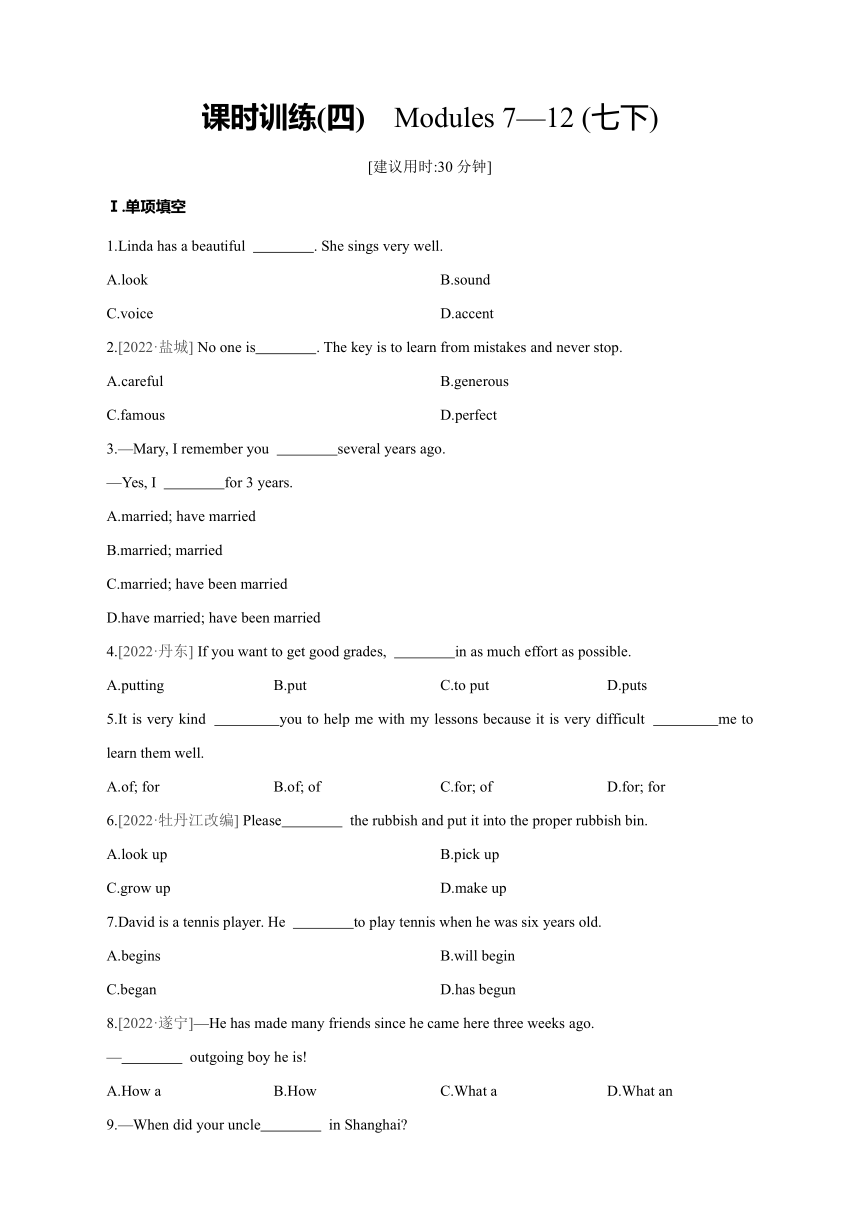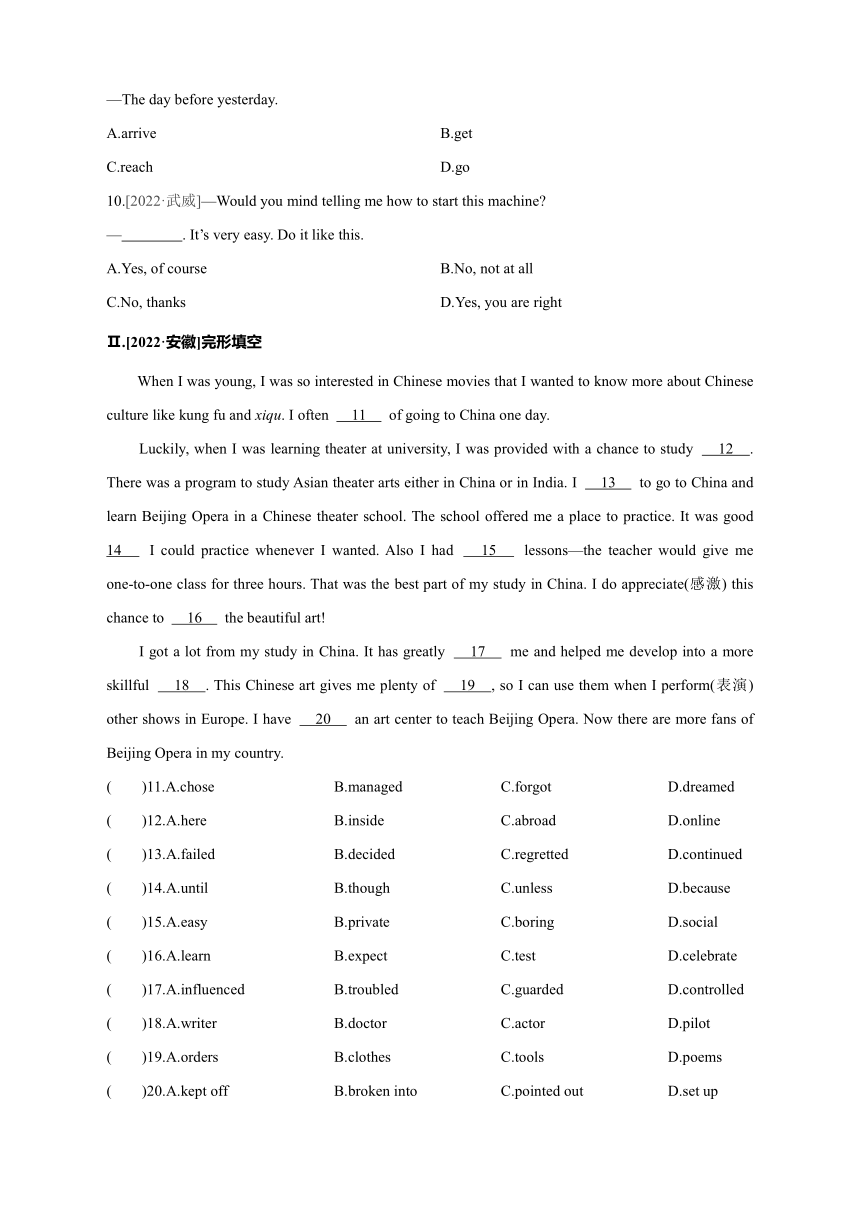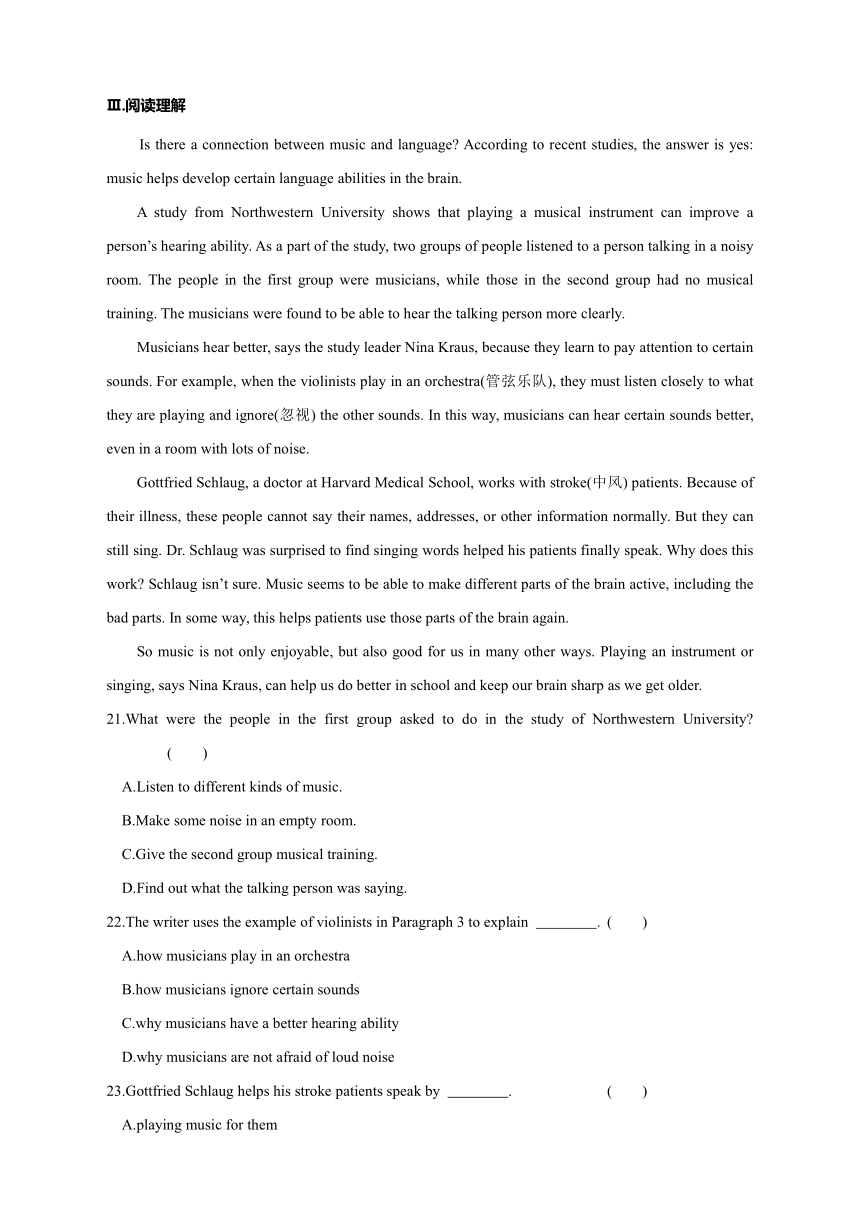2023年中考英语(外研版)一轮复习课时训练(04) Modules 7—12 (七下)(含答案)
文档属性
| 名称 | 2023年中考英语(外研版)一轮复习课时训练(04) Modules 7—12 (七下)(含答案) |  | |
| 格式 | docx | ||
| 文件大小 | 652.3KB | ||
| 资源类型 | 教案 | ||
| 版本资源 | 外研版 | ||
| 科目 | 英语 | ||
| 更新时间 | 2023-02-21 14:27:54 | ||
图片预览



文档简介
课时训练(四) Modules 7—12 (七下)
[建议用时:30分钟]
Ⅰ.单项填空
1.Linda has a beautiful . She sings very well.
A.look B.sound
C.voice D.accent
2.[2022·盐城] No one is . The key is to learn from mistakes and never stop.
A.careful B.generous
C.famous D.perfect
3.—Mary, I remember you several years ago.
—Yes, I for 3 years.
A.married; have married
B.married; married
C.married; have been married
D.have married; have been married
4.[2022·丹东] If you want to get good grades, in as much effort as possible.
A.putting B.put C.to put D.puts
5.It is very kind you to help me with my lessons because it is very difficult me to learn them well.
A.of; for B.of; of C.for; of D.for; for
6.[2022·牡丹江改编] Please the rubbish and put it into the proper rubbish bin.
A.look up B.pick up
C.grow up D.make up
7.David is a tennis player. He to play tennis when he was six years old.
A.begins B.will begin
C.began D.has begun
8.[2022·遂宁]—He has made many friends since he came here three weeks ago.
— outgoing boy he is!
A.How a B.How C.What a D.What an
9.—When did your uncle in Shanghai
—The day before yesterday.
A.arrive B.get
C.reach D.go
10.[2022·武威]—Would you mind telling me how to start this machine
— . It’s very easy. Do it like this.
A.Yes, of course B.No, not at all
C.No, thanks D.Yes, you are right
Ⅱ.[2022·安徽]完形填空
When I was young, I was so interested in Chinese movies that I wanted to know more about Chinese culture like kung fu and xiqu. I often 11 of going to China one day.
Luckily, when I was learning theater at university, I was provided with a chance to study 12 . There was a program to study Asian theater arts either in China or in India. I 13 to go to China and learn Beijing Opera in a Chinese theater school. The school offered me a place to practice. It was good 14 I could practice whenever I wanted. Also I had 15 lessons—the teacher would give me one-to-one class for three hours. That was the best part of my study in China. I do appreciate(感激) this chance to 16 the beautiful art!
I got a lot from my study in China. It has greatly 17 me and helped me develop into a more skillful 18 . This Chinese art gives me plenty of 19 , so I can use them when I perform(表演) other shows in Europe. I have 20 an art center to teach Beijing Opera. Now there are more fans of Beijing Opera in my country.
( )11.A.chose B.managed C.forgot D.dreamed
( )12.A.here B.inside C.abroad D.online
( )13.A.failed B.decided C.regretted D.continued
( )14.A.until B.though C.unless D.because
( )15.A.easy B.private C.boring D.social
( )16.A.learn B.expect C.test D.celebrate
( )17.A.influenced B.troubled C.guarded D.controlled
( )18.A.writer B.doctor C.actor D.pilot
( )19.A.orders B.clothes C.tools D.poems
( )20.A.kept off B.broken into C.pointed out D.set up
Ⅲ.阅读理解
Is there a connection between music and language According to recent studies, the answer is yes: music helps develop certain language abilities in the brain.
A study from Northwestern University shows that playing a musical instrument can improve a person’s hearing ability. As a part of the study, two groups of people listened to a person talking in a noisy room. The people in the first group were musicians, while those in the second group had no musical training. The musicians were found to be able to hear the talking person more clearly.
Musicians hear better, says the study leader Nina Kraus, because they learn to pay attention to certain sounds. For example, when the violinists play in an orchestra(管弦乐队), they must listen closely to what they are playing and ignore(忽视) the other sounds. In this way, musicians can hear certain sounds better, even in a room with lots of noise.
Gottfried Schlaug, a doctor at Harvard Medical School, works with stroke(中风) patients. Because of their illness, these people cannot say their names, addresses, or other information normally. But they can still sing. Dr. Schlaug was surprised to find singing words helped his patients finally speak. Why does this work Schlaug isn’t sure. Music seems to be able to make different parts of the brain active, including the bad parts. In some way, this helps patients use those parts of the brain again.
So music is not only enjoyable, but also good for us in many other ways. Playing an instrument or singing, says Nina Kraus, can help us do better in school and keep our brain sharp as we get older.
21.What were the people in the first group asked to do in the study of Northwestern University ( )
A.Listen to different kinds of music.
B.Make some noise in an empty room.
C.Give the second group musical training.
D.Find out what the talking person was saying.
22.The writer uses the example of violinists in Paragraph 3 to explain . ( )
A.how musicians play in an orchestra
B.how musicians ignore certain sounds
C.why musicians have a better hearing ability
D.why musicians are not afraid of loud noise
23.Gottfried Schlaug helps his stroke patients speak by . ( )
A.playing music for them
B.getting them to sing words
C.teaching them to play instruments
D.joining the bad parts of their brains
24.What is the main purpose of the passage ( )
A.To introduce different ways of playing music.
B.To give some advice about making our brain active.
C.To show the relationship between music and language abilities.
D.To share the results of recent studies on treating stroke patients.
Ⅳ.词汇运用
(A)根据句意及汉语提示完成句子。
25.The teacher raised her (声音) so that we could hear her clearly.
26.Did you (注意到) anyone enter the office yesterday evening, Linda
27.Bob is writing a (诗歌) for celebrating his grandma’s birthday.
28.Someone who is (有礼貌的) has good manners.
29.The students are all from the same (小学) school.
30.It’s true that (现代的) art is not to everyone’s taste.
(B)用括号中所给单词的适当形式填空。
31.Daniel felt much better after (relax) for half an hour.
32.To tell the truth, I fell (sleep) in the middle of her talk.
33.My uncle can speak (France) very well.
34.Most of the teenagers often have difficulty (get) up in the morning.
35.Danny’s father reads (newspaper) every evening.
Ⅴ.根据汉语意思完成句子。
36.我姐姐有很多工作要做。
My sister has a lot of .
37.这对夫妇在一个寒冷的早晨抵达了上海。
This couple Shanghai a cold morning.
38.我出生在黄河边的一个小村庄。
I a small village by the Yellow River.
39.他编写的这些音乐作品多么美妙啊!
wonderful pieces of music he wrote!
40.在他12岁时,他离开学校并开始工作。
He school and began to work 12.
【参考答案】
Ⅰ.1.C 根据“She sings very well.”可知,琳达有一副好嗓子。
2.D 3.C
4.B 考查祈使句。分析句子结构可知,从句为条件状语从句,主句没有主语,故应用祈使句。
5.A
6.B 根据“and put it into the proper rubbish bin”可知,此处指请把垃圾捡起来。
7.C 8.D 9.A 10.B
Ⅱ.[主旨大意]本文是一篇记叙文。文章讲述了一位外国朋友到中国学习戏剧艺术的经历以及将中国戏曲文化向世界推广的行为。
11.D 考查动词辨析。根据文章第一段第一句中的“I was so interested in Chinese movies that I wanted to know more about Chinese culture”可知,“我”想对中国的文化有更多的了解,因此“我”常常梦想有朝一日去中国。
12.C 根据下句“There was a program to study Asian theater arts either in China or in India.”可知,这个项目是要么在中国要么在印度学习亚洲戏剧艺术。相对于“我”来说,亚洲国家是“国外”。
13.B 考查动词辨析。根据上文可知“我”有去亚洲国家学习的机会,因此“我”决定到中国以实现“我”的梦想。
14.D 根据空后的“I could practice whenever I wanted”为“good”的原因,前后两个分句之间构成因果关系。
15.B 根据下文中的“…the teacher would give me one-to-one class for three hours”可知,一对一的课肯定为私人课程。
16.A
17.A 考查动词辨析。根据上一句“I got a lot from my study in China.”可知,这已经给“我”带来了巨大的影响。
18.C 根据第二段第一句“Luckily, when I was learning theater at university…”可知,“我”的专业为戏剧,毕业后应该做演员。
19.C 根据下一句“…so I can use them when I perform other shows in Europe.”可知选C。
20.D keep off远离;break into强行闯入;point out指出;set up建立。从空后“an art center”可知,应为建立艺术中心。
Ⅲ.[主旨大意]本文是一篇说明文,文章介绍了音乐和语言的关系。音乐有助于提高大脑的某些语言能力。
21.D 根据第二段中的“The people in the first group were musicians, …The musicians were found to be able to hear the talking person more clearly.”可知,在这项研究中,第一组的音乐家们被要求找出说话的人在说什么。
22.C 通读第三段可知,小提琴手在管弦乐队中演奏需仔细倾听演奏的内容,而忽略其他声音。以此为例说明音乐家为什么有更好的听力。
23.B 根据第四段中的“Dr. Schlaug was surprised to find singing words helped his patients finally speak.”可知,戈特弗里德·施劳格医生通过让病人唱歌词来帮助中风病人开口说话。
24.C 本文主要介绍的是音乐和语言的关系。音乐有助于提高大脑的某些语言能力。
Ⅳ.(A)25.voice 26.notice 27.poem
28.polite 29.primary 30.modern
(B)31.relaxing 32.asleep 33.French
34.getting 35.newspapers
Ⅴ.36.work to do 37.arrived in/got to; on
38.was born in 39.What 40.left; at the age of
[建议用时:30分钟]
Ⅰ.单项填空
1.Linda has a beautiful . She sings very well.
A.look B.sound
C.voice D.accent
2.[2022·盐城] No one is . The key is to learn from mistakes and never stop.
A.careful B.generous
C.famous D.perfect
3.—Mary, I remember you several years ago.
—Yes, I for 3 years.
A.married; have married
B.married; married
C.married; have been married
D.have married; have been married
4.[2022·丹东] If you want to get good grades, in as much effort as possible.
A.putting B.put C.to put D.puts
5.It is very kind you to help me with my lessons because it is very difficult me to learn them well.
A.of; for B.of; of C.for; of D.for; for
6.[2022·牡丹江改编] Please the rubbish and put it into the proper rubbish bin.
A.look up B.pick up
C.grow up D.make up
7.David is a tennis player. He to play tennis when he was six years old.
A.begins B.will begin
C.began D.has begun
8.[2022·遂宁]—He has made many friends since he came here three weeks ago.
— outgoing boy he is!
A.How a B.How C.What a D.What an
9.—When did your uncle in Shanghai
—The day before yesterday.
A.arrive B.get
C.reach D.go
10.[2022·武威]—Would you mind telling me how to start this machine
— . It’s very easy. Do it like this.
A.Yes, of course B.No, not at all
C.No, thanks D.Yes, you are right
Ⅱ.[2022·安徽]完形填空
When I was young, I was so interested in Chinese movies that I wanted to know more about Chinese culture like kung fu and xiqu. I often 11 of going to China one day.
Luckily, when I was learning theater at university, I was provided with a chance to study 12 . There was a program to study Asian theater arts either in China or in India. I 13 to go to China and learn Beijing Opera in a Chinese theater school. The school offered me a place to practice. It was good 14 I could practice whenever I wanted. Also I had 15 lessons—the teacher would give me one-to-one class for three hours. That was the best part of my study in China. I do appreciate(感激) this chance to 16 the beautiful art!
I got a lot from my study in China. It has greatly 17 me and helped me develop into a more skillful 18 . This Chinese art gives me plenty of 19 , so I can use them when I perform(表演) other shows in Europe. I have 20 an art center to teach Beijing Opera. Now there are more fans of Beijing Opera in my country.
( )11.A.chose B.managed C.forgot D.dreamed
( )12.A.here B.inside C.abroad D.online
( )13.A.failed B.decided C.regretted D.continued
( )14.A.until B.though C.unless D.because
( )15.A.easy B.private C.boring D.social
( )16.A.learn B.expect C.test D.celebrate
( )17.A.influenced B.troubled C.guarded D.controlled
( )18.A.writer B.doctor C.actor D.pilot
( )19.A.orders B.clothes C.tools D.poems
( )20.A.kept off B.broken into C.pointed out D.set up
Ⅲ.阅读理解
Is there a connection between music and language According to recent studies, the answer is yes: music helps develop certain language abilities in the brain.
A study from Northwestern University shows that playing a musical instrument can improve a person’s hearing ability. As a part of the study, two groups of people listened to a person talking in a noisy room. The people in the first group were musicians, while those in the second group had no musical training. The musicians were found to be able to hear the talking person more clearly.
Musicians hear better, says the study leader Nina Kraus, because they learn to pay attention to certain sounds. For example, when the violinists play in an orchestra(管弦乐队), they must listen closely to what they are playing and ignore(忽视) the other sounds. In this way, musicians can hear certain sounds better, even in a room with lots of noise.
Gottfried Schlaug, a doctor at Harvard Medical School, works with stroke(中风) patients. Because of their illness, these people cannot say their names, addresses, or other information normally. But they can still sing. Dr. Schlaug was surprised to find singing words helped his patients finally speak. Why does this work Schlaug isn’t sure. Music seems to be able to make different parts of the brain active, including the bad parts. In some way, this helps patients use those parts of the brain again.
So music is not only enjoyable, but also good for us in many other ways. Playing an instrument or singing, says Nina Kraus, can help us do better in school and keep our brain sharp as we get older.
21.What were the people in the first group asked to do in the study of Northwestern University ( )
A.Listen to different kinds of music.
B.Make some noise in an empty room.
C.Give the second group musical training.
D.Find out what the talking person was saying.
22.The writer uses the example of violinists in Paragraph 3 to explain . ( )
A.how musicians play in an orchestra
B.how musicians ignore certain sounds
C.why musicians have a better hearing ability
D.why musicians are not afraid of loud noise
23.Gottfried Schlaug helps his stroke patients speak by . ( )
A.playing music for them
B.getting them to sing words
C.teaching them to play instruments
D.joining the bad parts of their brains
24.What is the main purpose of the passage ( )
A.To introduce different ways of playing music.
B.To give some advice about making our brain active.
C.To show the relationship between music and language abilities.
D.To share the results of recent studies on treating stroke patients.
Ⅳ.词汇运用
(A)根据句意及汉语提示完成句子。
25.The teacher raised her (声音) so that we could hear her clearly.
26.Did you (注意到) anyone enter the office yesterday evening, Linda
27.Bob is writing a (诗歌) for celebrating his grandma’s birthday.
28.Someone who is (有礼貌的) has good manners.
29.The students are all from the same (小学) school.
30.It’s true that (现代的) art is not to everyone’s taste.
(B)用括号中所给单词的适当形式填空。
31.Daniel felt much better after (relax) for half an hour.
32.To tell the truth, I fell (sleep) in the middle of her talk.
33.My uncle can speak (France) very well.
34.Most of the teenagers often have difficulty (get) up in the morning.
35.Danny’s father reads (newspaper) every evening.
Ⅴ.根据汉语意思完成句子。
36.我姐姐有很多工作要做。
My sister has a lot of .
37.这对夫妇在一个寒冷的早晨抵达了上海。
This couple Shanghai a cold morning.
38.我出生在黄河边的一个小村庄。
I a small village by the Yellow River.
39.他编写的这些音乐作品多么美妙啊!
wonderful pieces of music he wrote!
40.在他12岁时,他离开学校并开始工作。
He school and began to work 12.
【参考答案】
Ⅰ.1.C 根据“She sings very well.”可知,琳达有一副好嗓子。
2.D 3.C
4.B 考查祈使句。分析句子结构可知,从句为条件状语从句,主句没有主语,故应用祈使句。
5.A
6.B 根据“and put it into the proper rubbish bin”可知,此处指请把垃圾捡起来。
7.C 8.D 9.A 10.B
Ⅱ.[主旨大意]本文是一篇记叙文。文章讲述了一位外国朋友到中国学习戏剧艺术的经历以及将中国戏曲文化向世界推广的行为。
11.D 考查动词辨析。根据文章第一段第一句中的“I was so interested in Chinese movies that I wanted to know more about Chinese culture”可知,“我”想对中国的文化有更多的了解,因此“我”常常梦想有朝一日去中国。
12.C 根据下句“There was a program to study Asian theater arts either in China or in India.”可知,这个项目是要么在中国要么在印度学习亚洲戏剧艺术。相对于“我”来说,亚洲国家是“国外”。
13.B 考查动词辨析。根据上文可知“我”有去亚洲国家学习的机会,因此“我”决定到中国以实现“我”的梦想。
14.D 根据空后的“I could practice whenever I wanted”为“good”的原因,前后两个分句之间构成因果关系。
15.B 根据下文中的“…the teacher would give me one-to-one class for three hours”可知,一对一的课肯定为私人课程。
16.A
17.A 考查动词辨析。根据上一句“I got a lot from my study in China.”可知,这已经给“我”带来了巨大的影响。
18.C 根据第二段第一句“Luckily, when I was learning theater at university…”可知,“我”的专业为戏剧,毕业后应该做演员。
19.C 根据下一句“…so I can use them when I perform other shows in Europe.”可知选C。
20.D keep off远离;break into强行闯入;point out指出;set up建立。从空后“an art center”可知,应为建立艺术中心。
Ⅲ.[主旨大意]本文是一篇说明文,文章介绍了音乐和语言的关系。音乐有助于提高大脑的某些语言能力。
21.D 根据第二段中的“The people in the first group were musicians, …The musicians were found to be able to hear the talking person more clearly.”可知,在这项研究中,第一组的音乐家们被要求找出说话的人在说什么。
22.C 通读第三段可知,小提琴手在管弦乐队中演奏需仔细倾听演奏的内容,而忽略其他声音。以此为例说明音乐家为什么有更好的听力。
23.B 根据第四段中的“Dr. Schlaug was surprised to find singing words helped his patients finally speak.”可知,戈特弗里德·施劳格医生通过让病人唱歌词来帮助中风病人开口说话。
24.C 本文主要介绍的是音乐和语言的关系。音乐有助于提高大脑的某些语言能力。
Ⅳ.(A)25.voice 26.notice 27.poem
28.polite 29.primary 30.modern
(B)31.relaxing 32.asleep 33.French
34.getting 35.newspapers
Ⅴ.36.work to do 37.arrived in/got to; on
38.was born in 39.What 40.left; at the age of
同课章节目录
- Module 1 Travel
- Unit 1 We toured the city by bus and by taxi
- Unit 2 It's a long story.
- Unit 3 Language in use
- Module 2 Education
- Unit 1 They don't sit in rows.
- Unit 2 What do I like best about school?
- Unit 3 Language in use
- Module 3 Life now and then
- Unit 1 They sometimes work harder.
- Unit 2 I think life is better today.
- Unit 3 Language in use.
- Module 4 Rules and suggestions
- Unit 1 You must be careful of falling stones.
- Unit 2 we must keep the camp clean.
- Unit 3 Language in use.
- Revison A
- Module 5 Look after yourself
- Unit 1 We'd better get you to hospital.
- Unit 2 Get off the sofa!
- Unit 3 Language in use.
- Module 6 Eating togethe
- Unit 1 When is the school-leavers' party?
- Unit 2 Knives and forks are used for most Western
- Unit 3 Language in use
- Module 7 English for you and me
- Unit 1 Have you ever been to an English corner?
- Unit 2 We all own English.
- Unit 3 Language in use
- Module 8 My future life
- Unit 1 Here's to our friendship and the future
- Unit 2 I know that you will be better at maths.
- Unit 3 Language in use
- Revison B
